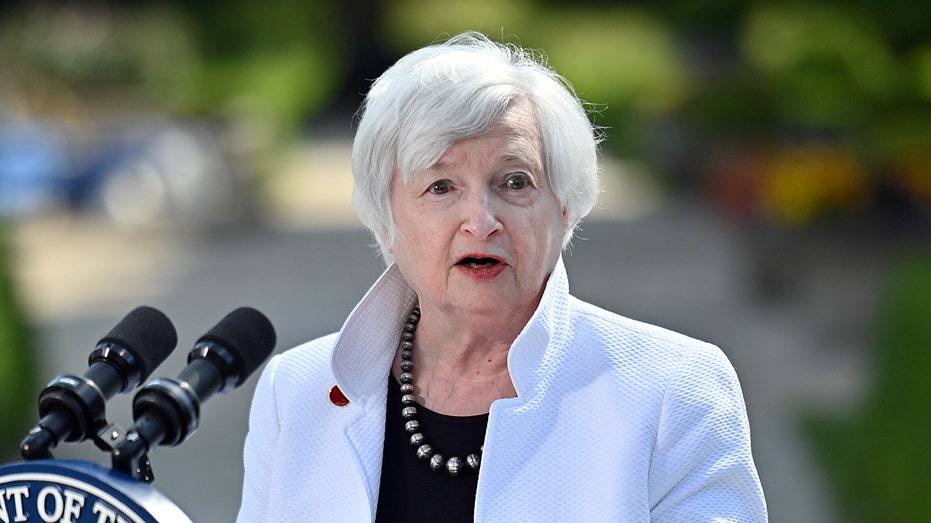Biden says 'we're not going to be in a recession' ahead of GDP numbers: 'God willing'
White House tries to redefine a recession
Kevin Mahn, president and chief investment officer of Hennion & Walsh asset management, and Baird investment strategy analyst Ross Mayfield weigh in and discuss whether they believe the U.S. is in a recession on ‘Mornings with Maria.’
President Biden on Monday said, "God willing," the United States is "not coming into recession," ahead of the upcoming report that could show another negative GDP quarter.
Biden, who is recovering from COVID-19, took questions virtually from reporters on Monday.
The president was asked how worried Americans should be about a looming recession, as the Biden administration waits for the GDP report amid recession fears.
"We're not coming into recession, in my view," Biden said Monday, saying that the unemployment rate "is still the lowest we’ve had in history to the 3.6 area."
WHITE HOUSE SAYS A SECOND CONSECUTIVE QUARTER OF NEGATIVE GDP 'UNLIKELY' TO BE INDICATIVE OF RECESSION
"We still find ourselves with people investing," Biden said. "My hope is we go from this rapid growth to a steady growth, and so we'll see — we’ll see some coming down."
President Joe Biden speaks about the COVID-19 relief package in the State Dining Room of the White House, March 15, 2021, in Washington. ((AP Photo/Patrick Semansky) / AP Images) "But I don't think we're going to — God willing — I don't think we're going to see a recession," Biden said. Recessions refer to two consecutive quarters of negative economic growth. But in a blog post on July 21, the White House Council of Economic Advisers said that two consecutive quarters of falling GDP doesn't mean the country is in a recession. "What is a recession? While some maintain that two consecutive quarters of falling real GDP constitute a recession, that is neither the official definition nor the way economists evaluate the state of the business cycle," the blog post states. Citing figures from the National Bureau of Economic Research, the post states that their "recession indicator variables" have "exhibited strong growth in the U.S. economy since the start of the pandemic, and have continued to expand through the first half of this year." TREASURY SEC. JANET YELLEN ACKNOWLEDGES ECONOMIC ‘SLOWDOWN’ BUT DOWNPLAYS RECESSION FEARS Even if the Bureau of Economic Analysis' advance estimate of the second quarter GDP shows a negative number, the blog post says the country is likely not in a recession. "Based on these data, it is unlikely that the decline in GDP in the first quarter of this year — even if followed by another GDP decline in the second quarter — indicates a recession," the post states. Meanwhile, inflation surged to a new 40-year high in June. Earlier this month, the Labor Department said that the consumer price index, a broad measure of the price for everyday goods, including gasoline, groceries and rents, rose 9.1% in June from a year ago. Prices jumped 1.3% in the one-month period from May. Those figures were both far higher than the 8.8% headline figure and 1% monthly gain forecast by Refinitiv economists. FILE – U.S. Treasury Secretary Janet Yellen speaks during a news conference, after attending the G7 finance ministers meeting, at the Winfield House in London, June 5, 2021. (Justin Tallis/Pool via REUTERS / Reuters Photos) It marks the fastest pace of inflation since December 1981. So-called core prices, which exclude more volatile measurements of food and energy, climbed 5.9% from the previous year. Core prices also rose 0.7% on a monthly basis — higher than in April and May — suggesting that underlying inflationary pressures remain strong and widespread. SINCE BIDEN ADMIN CALLED INFLATION ‘TRANSITORY’, US HAS SEEN 13 STRAIGHT MONTHS OF SOARING COSTS Price increases were extensive, suggesting that inflation may not be near its peak: energy prices rose 7.5% in June from the previous month, and are up 41.6% from last year. Gasoline, on average, costs 59.9% more than it did one year ago and 11.2% more than it did in May. The food index, meanwhile, climbed 1% in June, as consumers paid more for items like cereal, chicken, milk and fresh vegetables. In another worrisome sign, shelter costs — which account for roughly one-third of the CPI — sped up again in June, climbing 0.6%, matching an 18-year high set in May. On an annual basis, shelter costs have climbed 5.6%, the fastest since February 1991. CLICK HERE TO READ MORE ON FOX BUSINESS Rent costs also surged in June, jumping 0.8% over the month, the largest monthly increase since April 1986. Rising rents are a concerning development because higher housing costs most directly and acutely affect household budgets. Another data point that measures how much homeowners would pay in equivalent rent if they had not bought their home also jumped 0.7% in June from the previous month. FOX Business' Adam Sabes and Megan Henney contributed to this report. Source: Read Full Article


